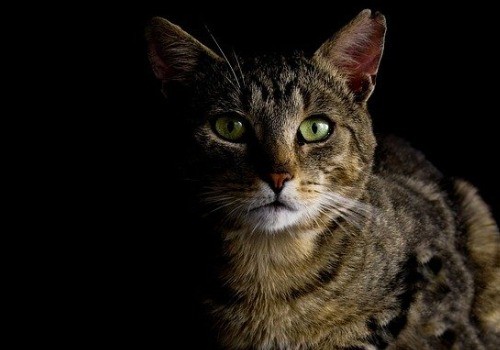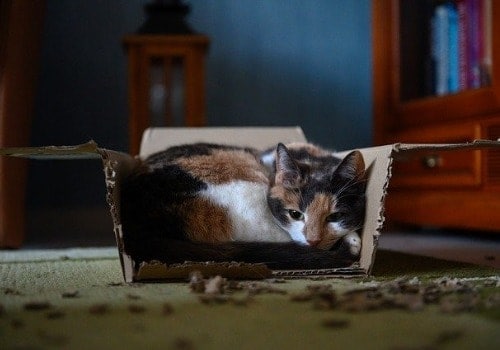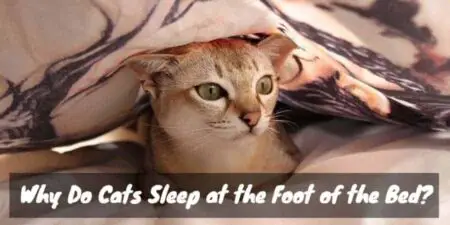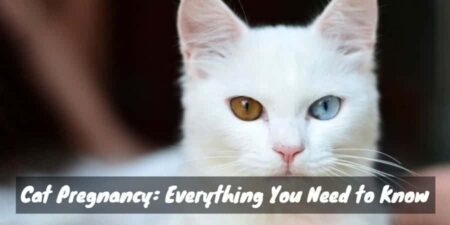You’re tucked into bed and off in dreamland when suddenly a noise jolts you awake. It’s your cat yowling from down the hall, suddenly full of energy at the worst possible moment. Night after night, you find your sleep interrupted by the bursts of noise and activity from your feline companion.
Cats are members of the family, but like any family member they sometimes get under your skin, especially when you’re tired and trying to get some rest. Why does your cat cry at night – is something wrong or is it just for fun? Let’s take a deep dive into the world of the cat and find out the reason behind these nighttime noises.
Late to Rise: The Feline Biological Clock
Rising and Setting

Many people think that cats are nocturnal animals, a fair assumption since they tend to sleep all day, every day. But technically, cats are crepuscular (active at dawn and dusk), not at night.
The difference is subtle but important. Nocturnal animals are active at night, while crepuscular animals are active at dawn and dusk, the “in between” stages of the day.
[amazon bestseller=”pets camera”]
Cats likely became active at dawn and dusk in order to take advantage of the cool temperatures during this period. Hunting is an exhausting activity and they could risk overheating in the full sun.
The low sun at first and last light provides more than enough light for a cat’s acute vision but hinders the weak eyesight of prey animals, increasing the chance of catching a meal. Plus other predators, such as hawks and other birds of prey, can’t see as well without strong sunlight, so there’s less competition for food at these times.
A Not-So-Deep Sleep
Dawn and dusk don’t last very long, so the remainder of a cat’s day is filled mostly with sleep. Sixteen hours of sleep a day is considered normal for an adult cat, twenty hours for a kitten – practically the inverse of a human’s sleep requirements. But cats experience sleep much differently than people do, and they’re surprisingly active even when they appear to be passed out cold.

When humans wake up, they tend to be groggy and sluggish, “awake but not awake” as it’s often described. This is especially true if they’re awakened at the wrong point in their sleep cycle, such as during the deep REM sleep.
It takes some time (minutes or even hours) for all faculties to become fully functional after rising. Until then, processing speeds are low, memory is poor and motor skills are on par with those of someone who is legally drunk.
Cats don’t suffer from this problem. Aside from a very short period of REM sleep (six minutes, compared to the 90 to 120 minutes for humans) they’re easily awoken.
Their noses and ears remain active during this light sleep, on full alert for scents and sounds that indicate the arrival of prey or danger. Any unusual sensory input and the cat rises as if it was never asleep at all, fully functional and ready to prowl or protect.
A Cry in the Dark: Nighttime Noises Decoded
Armed with knowledge about when and how cats sleep, we can begin to understand why their periods of activity clash so loudly with ours. The wee hours between 3 and 6 AM are naturally prime time for these early morning hunters, but sometimes the noise reaches concerning levels of volume or frequency. Let’s examine the many reasons why a cat might cry at night – and find out what to do about them.
All Fun, All the Time
[amazon bestseller=”cat active toys”]
A housecat’s nature is to rise in the very early morning and head out on the hunt. But with a human to provide food and little, if any, prey to be found, that energy usually gets redirected into play. Kittens in particular will wake up with playtime on their minds and little else.
The result is noise: the thundering of paws up and down the hall, the jovial vocalizations of victory and defeat in the game of pretend hunting.
With all the humans asleep and nothing to stimulate them, cats can get bored very quickly and start to cry out for attention. The ultimate goal may be to get a play partner, but any attention is good attention to an antsy cat, so they demand it loudly. Humans often reinforce this by getting up when they hear the cries – it may not result in a long play session, but it tells the cat that being noisy earns them at least a little attention, and a little is better than none.
You can help mitigate your cat’s nighttime need for play by providing more stimulation, both during your waking hours and passively at night. Active play during the day and in the evening, especially with toys that simulate the act of hunting, will tire the cat out and condition it into a new, more tolerable play schedule. The cat should also have access to toys that it can play with on its own while you’re sleeping, strategically placed far away from your bed so any noise doesn’t reach your resting ears.
Cries of Hunger

Anyone who’s ever woken up due to hunger can attest that it’s an unpleasant sensation – to need food so badly you can’t sleep is painful and distressing. The same is true for cats, perhaps even more so than for humans since pet cats generally can’t feed themselves. A hungry or thirsty cat will wake prematurely with one thing on its mind: filling its stomach by whatever means necessary, which usually means yowling until someone gets up to help.
[amazon bestseller=”cat food 50 lb bag”]
If you find that your cat cries at night and leads you to its food bowl when you get up to investigate, it’s a good sign that mealtimes need to be adjusted. Adult cats without health problems do well with twice-daily feedings spaced around 12 hours apart. An early dinner can result in early morning hunger pangs.
You can resolve this by feeding dinner closer to your bedtime or by splitting it into two smaller meals, one given at your cat’s regular dinnertime and one given just before bed.
A cat that seems hungry may also be dehydrated – a common issue with pet cats, as commercial cat food contains much less moisture than freshly-caught prey. Fresh water should always be available and easy for your cat to access.
A gravity-fed water dish with a large reservoir can help ensure a constant supply of water. Some even have fountains that keep a stream of water circulating, which may appeal to cats who otherwise don’t like to drink water.
Physical (or Mental) Pain
If your cat is a senior, or if the nighttime crying is a sudden new development, something may be amiss healthwise. Kidney and thyroid diseases are common in felines, especially with age, and the pain they cause is often expressed vocally. A vet can examine the cat and diagnose any ailments; with treatment, the pain will subside, as will the noise.
Senior cats who start yowling at night may be experiencing dementia. Waking up and not knowing where they are or what anything is can be extremely distressing, resulting in cries of confusion.
Other symptoms of feline dementia include urinating outside the litter box and sleeping more than usual. If you notice these symptoms, a vet visit is necessary to rule out other causes and learn about supplements that may slow the progress of dementia.
Cats can feel anxious just like humans, especially if there are major environmental changes such as a move or a new person or animal in the house. Crying can be the cat’s way of letting you know that it’s uncomfortable or upset, particularly when it’s at its loneliest late at night.
[amazon bestseller=”Calming Between Cats at Home”]
If there are any big changes to the cat’s life, take special care to maintain as much stability for the cat as possible. Stick to its old feeding and playtime schedules to reassure the cat that everything is fine despite the new differences. If you don’t already, consider allowing your cat to sleep in bed with you – your comforting presence will go a long way towards helping it adjust to the new changes and curb the nighttime crying.
"In ancient times cats were worshipped as gods; they have not forgotten this."
-- Terry Pratchett





